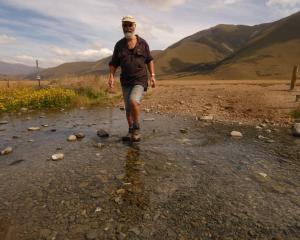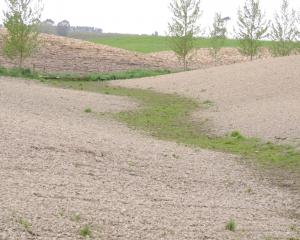
A three-year project to develop the test, co-led by Discovery Fellow Htin Lin Aung and Associate Professor Michael Knapp began in Dunedin yesterday.
Assoc Prof Knapp said an idea for the project came from a comment by his father-in-law, a dairy farmer in Taranaki, calling for a quicker way to test his herd on-farm for Johne’s disease.
He shared the idea with Dr Aung, who took the project further by including bovine tuberculosis to the disease detection list.
They then mustered a team with technical knowledge and a research project was proposed.
"This is very exciting because it is tangible."
Dr Aung said the current testing regime for bovine tuberculosis required a vet or skilled technician to scratch the skin of cattle and return three days later to see if there was a reaction to determine if it was positive for the disease.
The scratch test could produce false-positive results and cattle could be killed unnecessarily, or a false-negative result, where an infected cattle passes a test and remains contagious and in a herd.
"The current test is not fit-for-purpose," Dr Aung said.
University of Otago business development manager and patent attorney Thomas Ribeiro said he helped researchers at the university get their ideas funded and into the domestic and international market.
The project was given $1 million in funding from the Ministry of Business, Innovation and Employment’s latest Endeavour Fund investment round.
"We hit the jackpot," Mr Ribeiro said.
The aim was to create a test which could be administered by anyone to get an accurate result quickly so they could act sooner to limit the impact.
A test would be non-evasive but what type of sample would need to be taken from an animal would remain on a need-to-know basis until the intellectual property was protected.
"We can’t give too much away," Mr Ribeiro said.
Mr Ribeiro hoped once the new equipment was developed, it would be a "platform technology" and be used in other projects seeking to diagnose other diseases in animals and humans.
Assoc Prof Knapp said the components they were putting together for the test had worked individually.
"Will they work together? We are convinced they will because there is no reason that they shouldn’t."
Dr Aung agreed.
"We will deliver."
The DairyNZ website states Johne's Disease was estimated to cost New Zealand up to $88 million in lost production each year.
A Treasury New Zealand document states the cost of implementing the current bovine tuberculosis plan was about $80 million.
The Crown contributes about $30 million per year, and the rest was is met by the cattle and deer industries and regional councils.















